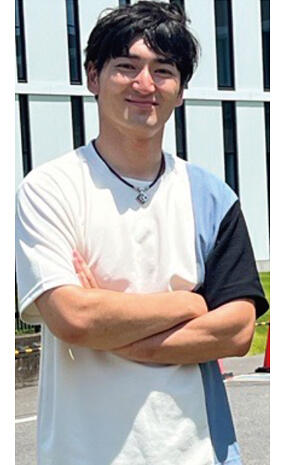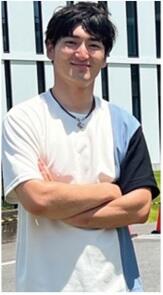
National Institutes for Quantum Science and Technology (QST)
Senior Researcher, QST
Q1. What inspired you to become a researcher?
A1. The Great East Japan Earthquake and resultant nuclear power plant accident in Fukushima led me to study radiation chemistry at a university in France.
When I was in high school, I aimed to get a position related to environmental issues, so I entered Kobe University, which has a faculty that teaches oceanography. The major reasons that caused me to pursue my current field were the Great East Japan Earthquake on March 11, 2011, and the resultant accident in Fukushima at the First Nuclear Power Plant of the Tokyo Electric Power Company. The accidents and effects of radioactive materials were reported every day at that time. I started studying radiation because I hoped to acquire accurate knowledge to solve the environmental problems associated with nuclear power plants.
During my studies, I learned that radiation is also used for cancer treatment, and so decided to focus on research in the field. In my quest to become a researcher, I finished doctoral course in both Kobe University and the University of Strasbourg in France. I feel that being able to address research that transcends the boundaries not only of research fields but also of countries has been a valuable experience that has guided me to this day.

Q2. What kind of research are you doing now?
A2. I am now focusing on the sensitizing effect of gold nanoparticles, especially addressing to elucidate the mechanisms for the enhancement the biological effectiveness.
My current primary research theme is ultra-high dose rate (FLASH) radiotherapy. FLASH is a new method that involves applying radiation at ultra-high dose rate ≥40 Gy/s, which is more than a thousand times higher than the conventional dose rate with about 0.03 Gy/s. Because FLASH can suppress the side effects in surrounding normal tissues while maintaining therapeutic effects on cancer cells, it is a topic of active research in Japan and overseas as a radiation therapy that does not impair patients' quality of life. Although the effects of FLASH have been confirmed in biological experiments on animals, the mechanism behind these remain unclarified. My research focuses on dose rate dependence of water radiolysis products, especially OH radicals that efficiently react with proteins and DNA. Furthermore, as part of JST's ERATO 'Kataoka Line X-ray and Gamma-ray Imaging' project, I am addressing to clarify the mechanism of the sensitizing mechanism of gold nanoparticles.
In 2020, the research team experimentally demonstrated with a fluorescent probe that the yield of OH radicals changes depending on the dose rate. In the future, I would like to measure the yield of other water radiolysis products and clarify the mechanism underlying the therapeutic effect of FLASH irradiation.

Q3. What is important in your research?
A3. It is the conceptualization of 'what I can do now.' I am driven by 'what I like' and 'what I find interesting.'
In my private life, I am also focusing on training in Taekwondo to represent Japan. Rather than pursuing the perfect balance of daily research and practice, I place greater focus on 'Which one should I prioritize now?' and 'What should I accomplish, and by when?' and focus on both daily research and practice. I like both research and Taekwondo, so I value enjoying and focusing on them.
A great professor I met while studying in Canada once told me, "It is important not to focus solely on writing impactful papers, but also to contribute diligently to your research field." He said, "Accumulating the daily efforts will one day lead to the seeds of great research.'' At times, I get anxious because I do not see results; however, I remember these words and switch to 'do what I can now.'
My driving force behind working on anything, not just research, is the notion of 'I like it' or 'It looks interesting.' I believe that if you follow your heart, it will naturally lead to your career path and where you wish to go.
(Article: Manami Yokoi)

Profile
Tamon Kusumoto
Born in Hyogo Prefecture.
Completed his doctoral course at the University of Strasbourg, France in 2017 and finished a doctoral program at the Department of Maritime Sciences of the Graduate School of Maritime Sciences at Kobe University in 2018.
Ph.D. (Physical Chemistry and Engineering).
After working as a postdoctoral researcher at QST he assumed his current position in 2022.
Since 2023, he has been a researcher in the Exploratory Research for Advanced Technology (ERATO) program, working on the 'Kataoka Line X-ray and Gamma-ray Imaging' project.




